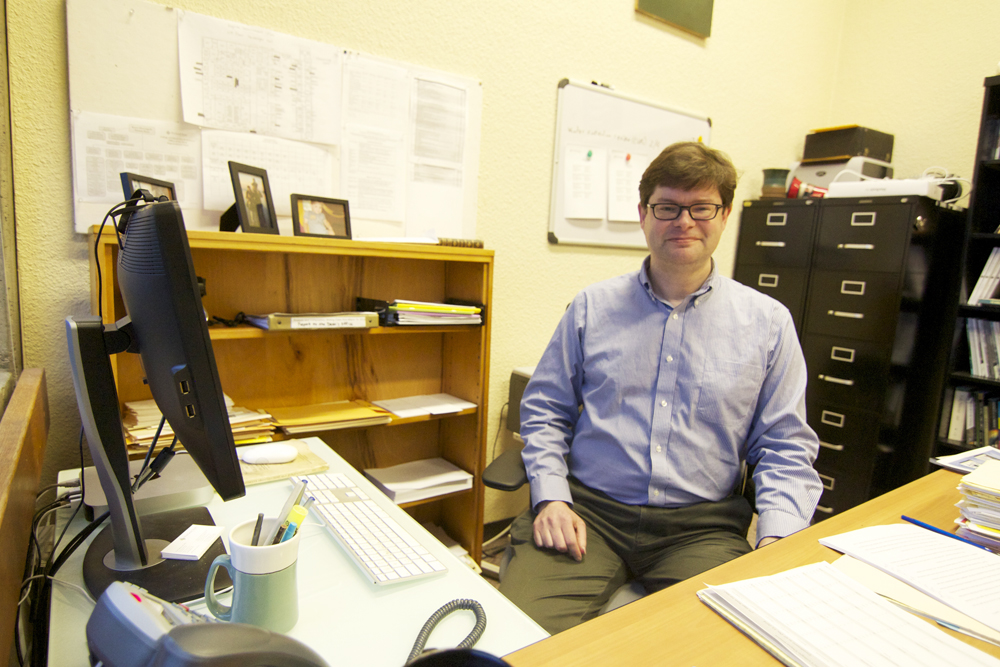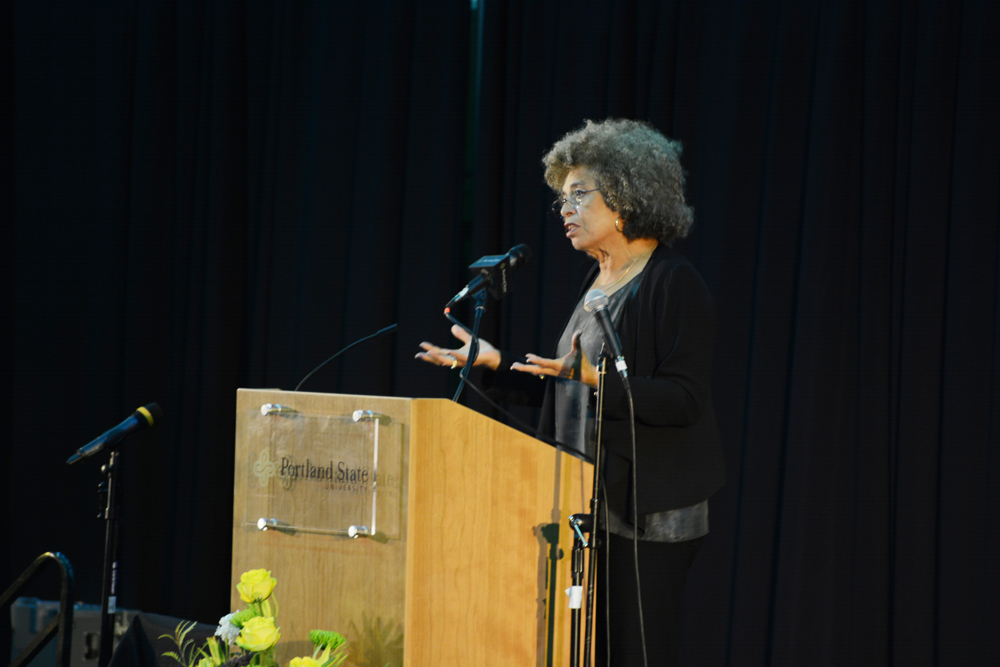The Portland State Student Media Board held a public meeting on Tuesday, Jan. 20 to determine the fate of two student-run publications, Portland Spectrum and the Rearguard. Both publications were under scrutiny primarily for lack of consistent publication.
The Spectrum is PSU’s only student-run magazine. Recently the magazine transitioned in name and focus from the politically conservative Portland Spectator to its current incarnation that now focuses mainly on science writing.
The Rearguard is the university’s alternative voice newspaper with the mission of amplifying oppressed and underrepresented voices on campus.
Both publications are scheduled to print monthly. Since the beginning of fall term the Spectrum has printed one issue. The Rearguard has printed none. In the meantime, numerous newsworthy events that have had an effect on minority students have elapsed.
“There were a number of events throughout this past year where the Rearguard really could have asserted itself as a voice for the marginalized or the underrepresented,” said Student Media Coordinator Reaz Mahmood. “It didn’t cover news in a prominent way—that I’m aware of—at that time. I was looking for it.”
Mahmood referenced the threatened faculty strike and the arming of campus officers as journalistic opportunities the Rearguard did not take advantage of.
When it became apparent that the publications were unable to successfully produce their print issues on time, a deadline was imposed by Mahmood per a recommendation by the board. Both publications were given until the second week of January to produce a print issue.
Of the two, only the Spectrum was able to meet that deadline. As a result, the Jan. 20 meeting dealt almost exclusively with the Rearguard.
Future of the Rearguard
Aside from failing to meet print deadlines, lack of engagement was cited as an issue for the Rearguard. During the meeting it came to light that the Rearguard editorial staff had conducted a single staff meeting, which occurred prior to fall term of this year.
During a routine fire and safety inspection, members of Student Activities and Leadership Programs discovered that computers, which had been purchased for use by the Rearguard, remained largely untouched.
Only one computer had been opened, set up and used by Rearguard Arts & Culture editor Brie Barbee.
Originally the board had proposed four possible outcomes for the Rearguard and the Spectrum. Those outcomes included maintaining both publications as they were, merging the two publications with one absorbing the other, merging the two publications to create a new publication or the revocation of the respective publications’ official statuses.
“It seems like there’s an interest in having a voice on campus for an alternative viewpoint,” said Abbey Gaterud, assistant professor, publisher at Ooligan Press and member of the board. “At the same time there is the other side of that, the interest of the student fees and that we’re essentially earmarking money each year for publications that aren’t doing anything. That’s a student consideration just as much as having the voice on campus.”
The idea of temporarily revoking the Rearguard’s official status within the university was presented by Mahmood. The proposal would have forced the publication to reapply for recognition, but would have potentially allowed for it to return in a new format and with a refined mission statement.
Lee Shaker, assistant professor of communications and board member, cited the difficulty of finding money for new publications, let alone returning ones.
“I think killing the publications, just ending the publications, I think that’s not our choice. It’s really up to the students. I also think that once you close something down, getting it going again is unlikely given the budget considerations.It’s squeezing blood from a turnip around here,” Shaker said.
After a lengthy discussion the board determined that an official recommendation regarding the the Rearguard would be tabled pending further review. At that point the board will either issue recommendations regarding the structure and scope of the publication or make recommendations to student government regarding the viability of the newspaper.
In the meantime, the board voted unanimously to seek a new editor-in-chief for the Rearguard, a position which is presently vacant.
The Student Media Board is currently accepting applications for the position of editor-in-chief of the Rearguard. The selected applicant will go through a period of training and will officially assume the position starting spring term.
The delay caused by the application and training process has stirred up concern among the remaining editorial staff for the Rearguard. By the time the process is complete, roughly two-thirds of the academic year will have elapsed before the Rearguard can feasibly produce an issue.
“I see the benefits of reaching out to the student body and looking for more people to join the publication, as well as advertising for the newspaper, but I am worried that this will only further delay our publishing schedule. There isn’t much we can do until a new [editor-in-chief] is in place,” Barbee said.
The deadline for the application is Wednesday, Feb. 4 at 5 p.m. Interested students can submit an application at bit.ly/rearguardapp.
Paul Collins, associate professor and chair of both the Student Media Board and English department, said editor-in-chief is not an entry level position and that prior experience in a newsroom environment is highly preferred.
“The editor-in-chief, along with coordinating things, has to know how to appoint a staff,” Collins said. “They have to know what the staff’s jobs are. Any time you have a job like that you need to know your own job, and you kind of need to know at least a little bit about everybody else’s job, too.”
A generational shift
The recent troubles with both the Spectrum and the Rearguard have brought to light deeper issues in Student Media, such as retention of staff and the generational transition of knowledge in a college environment.
Both publications faced a complete turnover in staff between the end of the previous academic school year and fall term.
“With the Rearguard in particular, but also the Spectrum, both of the staffs experienced complete turnover from the previous year,” Mahmood said. “So there was not that training in that same sense as there might be in others years, if they got lucky with recruiting and retention of staff.”
Collins cited the recent decline in Student Media funding and the lack of recalibrated expectations as a problem that needs to be addressed going forward.
“Maybe at some point it becomes unrealistic to expect the same number of issues out of significantly less money,” Collins said.
The board also noted lack of student interest as a hurdle for Student Media. According to the Student Media Board charter, the board itself is supposed to consist of five faculty members, five students, a member of the classified staff and a representative of the community. Presently there are no students on the board.
The charter also requires student media publications and stations, such as the Vanguard and KPSU, to advertise open student board positions for the first two weeks of the fall term. A review of the Vanguard archives revealed that no such advertisement went to print. Additionally, no KPSU advertisement was aired.
The charter also stipulates that university departments advertise open positions, which was accomplished in an email distributed by the Associated Students of PSU and forwarded through various department listserv emails.
Further complicating the issue is the lack of available university curriculum dealing directly with journalistic writing and publication management. The university has had no formal journalism program since 1981, when President Joseph Blumel axed the program due to widespread budgetary cuts.
Both Collins and Shaker agreed that there is more their respective departments can be doing to make up for the lack of journalistic educational opportunities.
“I do wonder if there might at least be better coordination between what departments can do…so that the students in these departments can actually be working on preparation, or working with these publications a bit more, and have that coordinated with departments at least to some degree that isn’t contrary to the basic idea of a very free student press,” Collins said.







I am struggling to articulate how incredibly disappointed I am with the content of this article. I find it very telling that even though it is stated that the Rearguard serves the, “mission of amplifying oppressed and underrepresented voices on campus” you have only interviewed and quoted staff members that are white or white-passing when over 50% of the staff on the paper were neither. You also fail to mention that your quote from Reaz is grouping together staff performance from both last year and this past fall (2014) term. He mentions events that were not the current staffs responsibility to cover (with the exception of the arming of campus security officers). This is incredibly important to look at because I think that if you have one Editor in Chief that doesn’t perform their tasks satisfactorily it could be a fluke. If those same barriers persist in the following term with entirely new staff it’s time to look to their supervisor over ALL of the people who need to be held responsible. I implore your paper to ensure that they have well-rounded reports in the future that don’t look so strongly biased as this one does. I make this statement as a sub-editor of the Reargaurd this past fall term. I would have been more than willing to do an interview for this issue, as would the remaining staff other than Ms. Barbee. The fact that I was not contacted until after this cover story was already posted and published concerns me and reflects poorly on the newspaper as whole and the staff involved in the making of the article.
I wish I could say I was surprised.
Student Activities & Leadership Programs took charge of student media for the first time last year, and did a commendable job of being precisely as intrusive and suffocating as their reputation amongst other student organizations implied. The person who had served as student publications advisor for over ten years chose to resign rather than work under SALP; we probably should have taken that as a sign.
Pay structure, printing, advertising – nothing can be done anymore without SALP’s explicit advance approval, assuming you filed the paperwork the appropriate eight years in advance. As a result, the workload expectations of the editorial collective have increased tremendously; of course, they’re expected to do all this extra work for a fraction of their original pay.
I shouldn’t even say pay: student media editors are compensated for their time with SALP’s ill-thought “leadership scholarships” rather than wages now, because of course if you paid them wages they’d be protected under Oregon labor laws. Then you wouldn’t be able to just casually not pay them for six months and then have the audacity to act surprised when nothing gets printed.
Goodness, I wonder why you’re having a hard time finding people to work there. It’s probably because students are like, super dumb and lazy, right? Yeah. Probably.
Any of this might be vaguely justifiable if the Rearguard had a history of gross misappropriation of funds or consistent failure to produce issues. They don’t, of course – or at least, they didn’t. The inability of SALP to actually trust students with any level of autonomy whatsoever has proven just as stifling in student media as it has everywhere else, and it looks like it will result in the same predictable outcome of quietly suffocating another student-led institution.
But hey, I’m sure the new “Green Roots Guard” or whatever other bland and boring form of student media the administration will replace the Rearguard with will be great at being completely unthreatening to the university. If not, they can always prevent the paper from doing anything and then blame student leadership when it fails.
It’s not like anyone will report on it.
—
Rett Mutchler
Editor-in-Chief 2011-12, 2013-14
The Rearguard
An alternative voice newspaper with the mission of amplifying oppressed and underrepresented voices on campus is sorely needed at PSU. There are so many opportunities that actually call-out for a broader discussion that are widely overlooked and go ignored with things being left unsaid… PSU can do better! Maybe it’s time to bring back the journalism major! Newspapers per se may be dying, but there will always be need for good investigative journalism!
Was anyone on the rearguard collecting pay during the time of not publishing? If so, is there a way to retro-actively take pay back to reimburse student media?
For a supposed group claiming they want to support minority voices, I got questions.
Where were ya’ll for Ferguson?
Where were ya’ll for the ongoing genocide of the Palestinians?
Where were ya’ll for Marissa Alexander?
For the most part the Vanguard published for the minority where as all I got from the rearguard was typical silence on controversial issues.
Ya’ll were given the privilege of resources, the privilege to publish, the privilege to voice the minority and we students got silence. smh
Spectator came through, but where were you rearguard? Silent like all people privileged enough to not be bothered with those that need to be heard. Looks like the posting stopped June 2014 for the Reargard online, why did it stop there? Who was in charge then and why are they not being brought forward? smdh